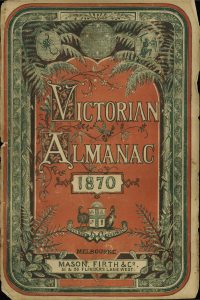[Editor: This article was published in the Victorian Almanac for 1870 (Melbourne, Vic.), 1869.]
Obituary — 1868-9.

Evans, Hon. George Samuel, LL.D. (23rd September, 1868), sometime editor of Herald newspaper, and for several years a member of the Legislative Assembly, in which he was distinguished for the classical and oratorical character of his speeches. He was twice a member of Governments of which Mr. O’Shanassy was the head, having held the respective offices of Postmaster-General and President of the Board of Land and Works. He died at Wellington, New Zealand.
Fawkner, Hon. John Pascoe (September 4, 1869, aged 77), the Father of the Colony. As a boy he was among the first Europeans who trod the soil which now is called Victoria. As a man he founded the city of Melbourne. He was forty-three years of age when he erected his first hut on the green slopes of the Yarra, and during the subsequent thirty-four years he witnessed changes which, looked back upon, must, in spite of the active part he took in bringing them about, have appeared magical. In all good works his exertions were prominent, and when an abuse raised its head no blow was more direct or vigorous than his. He was a town councillor when there was no other representative body in the colony, a member of the one House of Legislature when the colony possessed but one, and a senator as soon as a senate formed part of the Constitution. He was a member of the Legislative Council up to the time of his death.
Ferguson, Charles (December 27, 1868, aged 55), for many years Chief Harbour-master of Victoria — a position in which he was highly respected and esteemed.
Franklyn, Francis Burdett (January 1, 1869). Mr. Franklyn came to Melbourne sixteen years ago, and began business as a printer’s broker, and was for some years one of the proprietors of the Herald newspaper. He was highly esteemed for his many amiable qualities by a very wide circle of friends.
Hill, Rev. William (May 13, 1869), was an esteemed minister of the Wesleyan denomination. He arrived in the colony from India in 1854, held successive appointments in our largest centres of population, and was for some time Editor of the Wesleyan Chronicle, a position for which his literary attainments and classical taste eminently fitted him. He was murdered, while in the discharge of his ministerial duties, at the Pentridge Stockade, by George Ritson, a life-prisoner of the Crown.
Kyte, Ambrose (November 16, 1868, aged 46 years), arrived in the colony in 1840. From very humble circumstances he advanced to the possession of considerable wealth, and distinguished himself by several munificent donations to stimulate useful enterprise and promote the interests of Victoria. He was for some years a member of the Legislative Assembly.
Plunkett, Hon. John Hubert, M.L.C., N.S.W., and Q.C. (May 9, 1869, aged 68). Mr. Plunkett was the first Attorney-General appointed for the Australian colonies, and held that position for nearly twenty-four years.
Source:
Victorian Almanac for 1870, Melbourne (Vic.): Mason, Firth & Co., [1869], p. 61
Editor’s notes:
Whilst the almanac does not give a date of publication, it was published in 1869. The publication of the 1870 almanac was mentioned in The Argus (Melbourne, Vic.), 19 October 1869, p. 5.
Hon. = an abbreviation of “honourable”, especially used as a style to refer to government ministers, or as a courtesy to members of parliament (as a style, it is commonly capitalised, e.g. “the Hon. Member”)
LL.D. = Doctor of Law, an abbreviation of “Legum Doctor” (Latin, meaning “teacher of the laws”); the double L indicates a plural (just as “MSS” indicates a plural, “manuscripts”), in this case an historical reference to someone being a Doctor of both canon law and civil law
M.L.C. = Member of the Legislative Council
munificent = very generous, liberal, or lavish in the of giving of gifts, or in the bestowing of donations or money; (someone who is) bountiful, very generous
Q.C. = Queen’s Counsel: a senior or eminent barrister whose abilities, achievements, and standing have been recognised by the Crown and the Courts in the conferring of that title (during the reign of a King, the title used is “King’s Counsel”, with the initialism being “K.C.”); in some states the title of Senior Counsel (S.C.) has been used in modern times, so as to remove monarchical connotations; as QCs wear silk gowns of a particular style, they are also referred to as “silks”
Leave a Reply